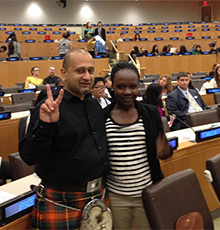Building PEACE through Storytelling
By Kiran Singh Sirah, 2011-13 Rotary Peace Fellow, Duke University and University of North Carolina at Chapel Hill

There are moments in our lives that we remember forever. These moments become our stories and help us understand and connect with a larger global community. When we tell our stories, we inspire others to tell their stories, and that produces positive change. Ultimately, through the power of storytelling, we build healthier communities, more effective workplaces, and schools of learning that enrich our lives.
My own story began when my family was forced to flee Uganda in 1972. Then President Idi Amin ordered the expulsion of the Indian minority from his country. My father, a young architect, received a job offer in south England from a sister company of the one he had worked for in Kampala, and there I was born. The refugees took with them stories of the lives they’d lived with classmates, coworkers, family members, and friends. They became a part of their new communities and identities. I grew up around these stories, and they became part of my story.
Growing up in England, I learned to tell these stories in my own voice, and they helped me navigate my own sense of belonging. We faced racism, but my parents encouraged me to pursue an education and embrace opportunity. I became an art teacher, and began to use storytelling and the power of visual and performing arts to enable young people to escape their feelings of marginalization, loneliness, and isolation.
After moving to Scotland, I established a number of art programs with the aim of fostering peace in Edinburgh and Glasgow. It was there that two retired police officers and members of Rotary noticed what I was doing, became my friends, and encouraged me to think of myself as a global citizen.
After a Rotary-backed cultural exchange, I applied for the Rotary Peace Centers program, and received a fellowship to the University of North Carolina at Chapel Hill, pursuing a master’s degree in folklore, peace, and conflict resolution. I further developed my understanding of storytelling. And I met many Rotary members, who I worked with to build local community partnerships, develop grassroots programs for schools, and serve in advisory roles at the United Nations.
When I left Scotland for the United States, I made a commitment to myself to dedicate my life toward peace. I have been given a great opportunity to advance storytelling at the International Storytelling Center. When we engage in storytelling, we experience new worlds, and draw closer to others, who are traveling similar paths to our own. These are the roots that build peace. Please join me in using your story to promote peace.
On 21 September, millions of people around the world will celebrate the International Day of Peace through activities, events, concerts, and festivals. What will you or your club be doing? Let us know below, and learn more about how Rotary Peace Centers equip leaders to be catalysts for peace in their communities.
_____